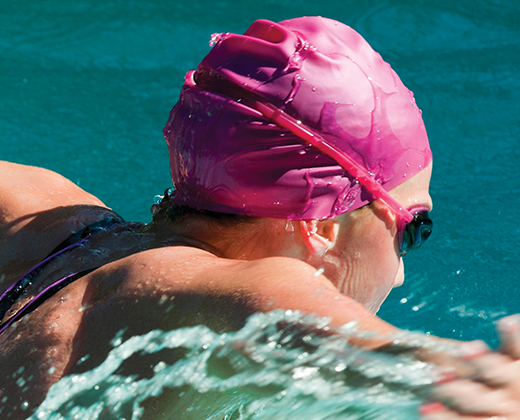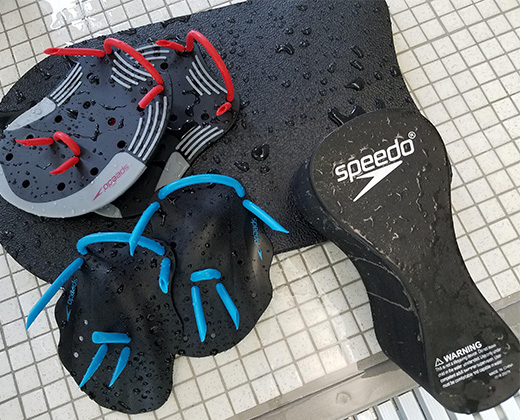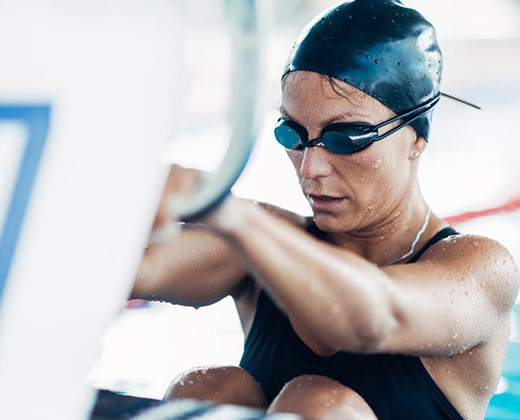Breaking Down the Backstroke Technique
Get back to basics with the Pro Tips swimming guide on the backstroke. Collegiate swimming coach Marc Christian breaks down what you need to know.
As the name implies, the backstroke is performed on your back. There’s a lot more to backstroke technique than just simply floating, however. Division I swim coach Marc Christian is here with his tips on how to swim backstroke.
BACKSTROKE HEAD AND BODY POSITION
While swimming backstroke, it is important to keep your body in a straight, horizontal position. Your shoulders and hips should roll slightly from side to side, keeping pace with your arm strokes. Throughout this rotation, your head should remain still and in a neutral position in line with your spine.
“You want to make sure [your head’s] not too far forward or too far back … with your eyes [looking] up at the ceiling,” Christian says.
Because you will be swimming on your back, your head should consistently be out of the water, giving you ample time to breathe.
BACKSTROKE ARMS AND HANDS POSITION
With the backstroke, your arms move in an alternating semicircular movement. Let’s take a closer look at each step:
- Begin with one arm above your head along the water’s edge and one by your side.
- Before the arm above your head breaks the water’s surface, position your hand so that your pinky enters first.
- As your hand begins to enter the water, bend at the elbow to create what is known as the “catch” position.
- Push back on the water and bring your arm back around to your side.
- At this point, the palm of your hand should be facing your hip so that your hand can exit thumb-first to begin the “recovery” phase of the stroke.
- Once your arm leaves the water, rotate your hand and prepare for reentry.
In order to time the stroke properly, try to ensure that when one arm begins the catch phase, the other recovers forward.
BACKSTROKE KICK
A major key to success in backstroke swimming is having a strong kick. The kick used in backstroke is very similar to the flutter kick seen in freestyle. The same principles will be used, despite being on your back. The kick should be more exaggerated in your hips and get progressively smaller toward your feet. Keep your toes pointed and kick in a small-yet-fast manner.
“One of the common mistakes of a beginner backstroker is that their kick is too big or they are kicking too much from their knees,” Christian adds.
HOW TO IMPROVE YOUR BACKSTROKE
Practice makes perfect, but there are a few additional ways to make the most of your backstroke training.
ADDITIONAL TRAINING AIDS
A training aid you can use for the backstroke is a nose clip, which is a small piece of bent wire that is covered in rubber or plastic. You can place it around your nose and it will squeeze your nostrils shut.
Christian states that the nose clip is a favorable training aid, adding that it is designed to “allow you to hold your breath better and prevent any incidental water from splashing up your nose and causing discomfort.”
HELPFUL BACKSTROKE DRILLS
A drill you can use to practice your backstroke is known as the “six-kick switch.” To complete this drill, start with one arm extended and one by your side. You will practice getting your arm into the catch position and complete six kicks. Once you’ve completed six kicks with your first arm, rotate and do the same with the opposite arm.
Now that you’re equipped with these backstroke tips, you can bring your other strokes to the next level with these Pro Tips guides on the freestyle stroke, butterfly stroke and breaststroke.








